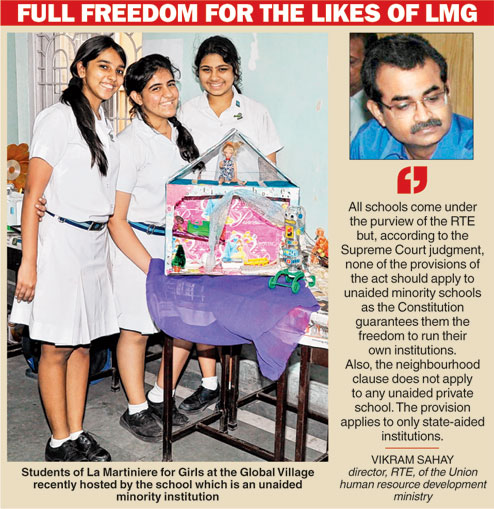 |
The right to education act guarantees every child schooling till Class VIII but minority institutions that don’t take government help can do things their way, the central officer tasked with the implementation of the law clarified in Calcutta on Monday.
Confusion about whether all schools came under the law and to what extent was sparked when the Bengal government tried to implement it almost ignoring the Supreme Court’s ruling allowing immunity to unaided minority institutions.
School education minister Bratya Basu had muddled matters further when he told a meeting with some school heads last month that all minority schools, “aided as well as unaided”, would have to comply with all provisions of the Right to Free and compulsory Education Act 2009 (RTE).
Several unaided minority institutions had also complained when the state education department asked them to get recognition certificates as part of the RTE.
The Supreme Court clarification had come when a section of unaided minority schools from across India had wanted to know whether they were also supposed to set aside a quarter of their seats for underprivileged children from the neighbourhood.
The apex court said no. Vikram Sahay, director, RTE, of the Union human resource development ministry, reaffirmed this on Monday.
Metro spoke to Sahay, in the city to address a seminar titled “RTE: Bane or Boon” organised by the MCC Chamber of Commerce, to try and clear some of the lingering doubts about the implementation of RTE.
Doubt: Which schools come under the RTE? Can the state government send notices regarding implementation of RTE to unaided minority schools? To what extent is the apex court judgment applicable to such schools?
Sahay: All schools come under the purview of the RTE but, according to the Supreme Court judgment, none of the provisions of the act should apply to unaided minority schools as the Constitution guarantees them the freedom to run their own institutions. Therefore the unaided minority schools should not have been issued the notices for seeking recognition by the state government.
Doubt: One of the RTE provisions bans use of corporal punishment. Does the exemption of the unaided minority schools give them the liberty to use corporal punishment.
Sahay: No. The unaided minority schools will not be allowed to use corporal punishment because it has been banned not just in the RTE, but there are also other Central and state legislations which disallow use of physical and mental torture on students.
Doubt: The Bengal government has claimed that it has written to the MHRD seeking clarification about the status of the unaided minority schools. Has the MHRD replied to the Bengal government?
Sahay: “ I don’t know whether the reply to the clarification has already been sent or not to the Bengal government.
Some of the other major RTE provisions include not failing any student from Class I to Class VIII, admitting students through drawing of lots and no interview for students and guardians during admission. Other than the unaided minority schools, the implementation of these aspects of the RTE are unclear to the schools that come under the purview of the act.
Metro placed some of these doubts on Sahay’s table as well.
Doubt: Do private schools (minority aided, non-minority unaided) need to comply with the RTE provision that says every school must accommodate students from its neighbourhood — those residing within 1km of the institution?
Sahay: The neighbourhood clause does not apply to any unaided private school. The provision applies to only state-aided institutions.
Doubt: The RTE says no child should be held back till Class VIII. Voices are being raised against the no-detention clause: how can the schools maintain discipline and their standards?
Sahay: The schools that come under the RTE purview will have to do away with the pass-fail system because the policy of detention can’t go together with the idea of protection of child rights. The state government and the schools will have to sit together and work out a suitable solution if there is a problem in implementing the auto promotion system till Class VIII.
Doubt: The RTE mandates that every child should be able to access quality education. What is the Centre’s stand about reimbursement of funds to schools which need to upgrade their infrastructure facilities?
Sahay: The Centre will allot necessary funds. But the state government should also realise that it has a responsibility to implement the act properly and make arrangements for providing the funds.
Do you have any doubts about the implementation of RTE? Tell ttmetro@abpmail.com










